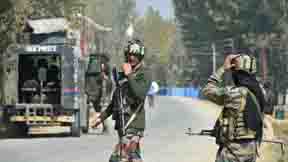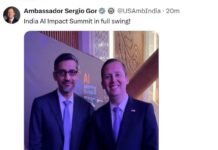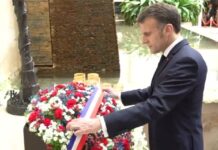 SRINAGAR: After a tumultuous 2016, Kashmir witnessed a relatively calm year but there were many issues, including the legal challenge in the Supreme Court to Article 35-A of the Constitution pertaining to special residency laws of Jammu and Kashmir that hogged national headlines.
SRINAGAR: After a tumultuous 2016, Kashmir witnessed a relatively calm year but there were many issues, including the legal challenge in the Supreme Court to Article 35-A of the Constitution pertaining to special residency laws of Jammu and Kashmir that hogged national headlines.
However, one of the biggest stories emanating from Kashmir in 2017 was the cancellation of by-poll to the Anantnag Lok Sabha seat – vacated by Chief Minister Mehbooba Mufti in April last year – in view of widespread violence during polling for Srinagar Lok Sabha seat by-election which left nine persons dead and scores others injured.
As the street protests of 2016 had not fully died down even in the spring of 2017, the PDP-BJP coalition government was not keen on holding the by-elections so soon. However, Election Commission went ahead with the process of polls.
The results were disastrous on almost all fronts. Such were the apprehensions of trouble around elections that authorities snapped Internet facilities a day before the polling on 9 April for the Srinagar Lok Sabha seat.
By the time polling ended, eight persons were dead – with another succumbing few days later. Only seven per cent voters turned up to exercise their franchise.
National Conference patriarch Farooq Abdullah, who lost in 2014, made a comeback to the Lok Sabha, defeating PDP candidate Nazir Ahmad Khan by over 10,000 votes – a huge margin considering that only 88,951 votes were cast.
A day after the polling for Srinagar, Tassaduq Hussain Mufti, brother of Chief Minister Mehbooba Mufti, asked the Election Commission to postpone the elections for Anantnag Lok Sabha seat till the situation in the valley improved.
Initially, the Election Commission pushed back the date for polling by a month but later cancelled the election altogether.
It was for the first time since 1991 that an election could not be conducted in Kashmir due to violence and apprehension of it spreading to entire valley.
While the 1991 Lok Sabha polls were not held in entire Jammu and Kashmir due to eruption of militancy, the Anantnag bypoll had to be cancelled due to threat to law and order by stone-pelting people.
The National Investigating Agency (NIA) stepped in to investigate the phenomenon of stone-pelting, especially as the youth were hampering the anti-militancy operations, after senior separatist leader Nayeem Khan admitted on camera that they were receiving funds to keep the Kashmir pot boiling.
Khan, several other separatist leaders and few businessmen were arrested by the NIA which found them allegedly involved in hawala trade, the proceeds of which were used for funding stone-pelting.
Several businessmen, especially those involved in cross-Line of Control trade between Srinagar and Muzaffarabad in Pakistan-occupied Kashmir were investigated by the NIA.
It was an aborted political take off for Tassaduq, the cinematographer turned politician, who was fielded by the PDP from the Anantnag seat. However, his involvement with government and politics continued as in May he was appointed the coordinator in the Chief Minister’s Grievance Cell, a post he gave up in early December.
Tassaduq was nominated as an MLC by his party, which was approved by the state Governor. Recently, he was inducted into the Mehbooba cabinet.
With the election dust settling down, some videos emerged on social networking sites depicting the security forces in poor light, which led to intense debate at national level on the tactics used by law enforcing agencies to deal with street protestors in Kashmir.
One of the videos showed a youth – who was going for a condolence gathering after casting his vote on 9 April – tied to the bonnet of a jeep by an army officer and paraded through over 20 villages as a human shield.
The incident prompted a former army general to say “Image of a ‘stone pelter’ tied in front of a jeep as a ‘human shield’, will forever haunt the Indian Army & the nation!”.
The other major issue that remained in the limelight was the legal challenge to Article 35-A of the Constitution, which allows Jammu and Kashmir to retain a 1920s law passed by the then Maharaja of the state.
The residency law bars people from outside Jammu and Kashmir acquiring any immovable property in the state.
As the Supreme Court is set to deliver a verdict on the validity of the law, the separatists threatened to launch a mass agitation in case the act was struck down by the apex court.
The separatists allege that repealing the law would lead to the Centre changing the demography of the Muslim-majority state by creating settlements on the pattern done by Israel in Palestine.
One of the biggest moves by the Centre with regard to Jammu and Kashmir was appointment of former IB chief Dineshwar Sharma in October as its special representative for initiating a sustained dialogue with all stakeholders in the state.
While Sharma visited the state twice since his appointment, he has not been able to make any headway as far as bringing the separatists to the dialogue table is concerned.
On the social crime front, incidents of braid chopping created a fear psychosis in the valley as dozens of cases were reported from across the length and breadth of Kashmir.
Although similar incidents were reported from elsewhere in the country as early as first week of August, the first such incident was reported in Kashmir towards later September.
While police could not nab anyone involved in braid chopping incidents, it arrested several youth on the charges of inciting mobs on the pretext of protests against braid chopping.
However, these incidents came to an abrupt halt towards the end of October and seem to have quickly disappeared from public memory.-PTI






